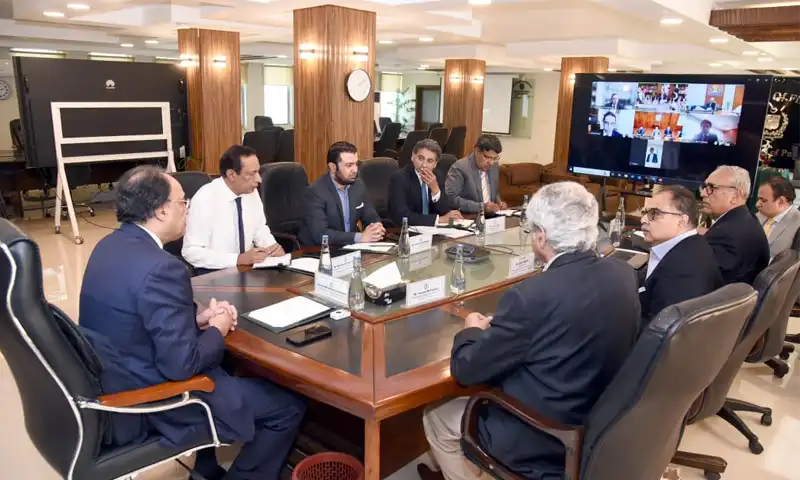- Web
- Feb 05, 2026
Aurangzeb calls for export-led, investment-driven growth
-

- Web Desk
- Apr 14, 2025

ISLAMABAD: Finance Minister Senator Muhammad Aurangzeb on Monday urged banks and financial institutions to align their lending strategies with the government’s broader push for export-led and investment-driven growth, stressing that Pakistan’s economic recovery must be sustainable and rooted in real market fundamentals.
According to a press release, the minister was chairing a high-level meeting in Islamabad on priority sector lending, which brought together top officials from the State Bank of Pakistan, the Pakistan Banks Association (PBA), and major commercial banks.
The discussion focused on how the financial sector can better support government efforts to boost exports and attract foreign direct investment (FDI), particularly in sectors that can generate exportable surplus.
Aurangzeb said the government is fully committed to fostering an enabling environment for strategic investments and underscored the need for banks to play a proactive role in facilitating growth. He cited the recent Pakistan Minerals Summit as a sign of rising investor confidence, noting that both domestic and foreign stakeholders are showing strong interest in high-value projects.
He also highlighted a major development in the maritime sector — the commitment by global shipping giant Maersk Line to invest $2 billion in Pakistan’s port and logistics infrastructure. “Such moves signal Pakistan’s growing role in regional trade corridors and global supply chains,” he said, adding that the financial sector must help unlock these strategic opportunities.
The finance minister revealed that the federal budget process had been advanced this year to allow for broader consultation. He personally visited various chambers of commerce to gather input and ensure the upcoming budget reflects economic realities and supports sustainable growth. “Our aim is not unsustainable short-term gains,” he said, “but durable, long-term development that avoids the boom-and-bust cycles of the past.”
While noting that macroeconomic stability had been achieved, Aurangzeb said this was only the beginning. The government, he stressed, remains focused on policies that encourage long-term investment and export growth.
Earlier in the meeting, PBA Chairman Zafar Masud presented an update on banking sector support for key areas including agriculture, small and medium enterprises (SMEs), and the digital and technology sector. He also outlined several initiatives, such as warehouse receipt financing, housing finance schemes, and tools to encourage efficient use of water and energy.
Concluding the session, the finance minister called for greater coordination between banks, investors, and policymakers to turn policy stability into real economic transformation.
Salaried workers urge tax relief as burden surges amid inflation
He particularly stressed the need to improve access to formal credit for smallholder farmers, suggesting that fintech tools like remote sensing and embedded finance could be key in reaching those without traditional collateral — in line with the prime minister’s vision for inclusive growth.




